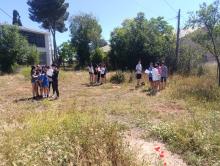Exploring Plant Biodiversity at Our School
Our students from 1st ESO in the bilingual programme have been working on a project and they wanted to share with us a report about their discoveries. Keep on reading to know more about their research:
Objective of the activity:
To discover how many and what types of herbaceous plants grow in the green areas of the school, and to assess their biodiversity.
How did we do it?
Fieldwork:
We went out to the schoolyard and randomly placed a 1-meter square or circle in four different areas of the lawn. In each area:
- We took a photo.
- We counted how many different species were present.
- We recorded how many individuals of each species there were.
- We identified the plants using guides, apps like PlantNet, or dichotomous keys.
Data organization:
Each group created a table with their results and photos. Then, all the data were combined to get an overall view.
What did we learn?
- Several species of herbaceous plants were identified.
- The Margalef biodiversity index was calculated:
For herbaceous plants, the index was 3.4, which indicates medium biodiversity.
Conclusion:
Although there is a variety of plants, biodiversity in the school’s green areas is limited, probably due to the small space available . Therefore, students proposed ideas to improve it, such as planting more species or creating small gardens.




